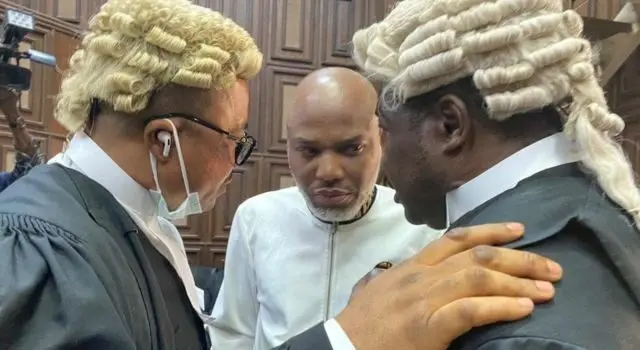BY ANTHONY OCHELA, ABUJA
The legal team representing Mazi Nnamdi Kanu, leader of the Indigenous People of Biafra (IPOB), has condemned the handling of his case, describing it as a gross miscarriage of justice and a violation of constitutional rights.
Addressing a press conference in Abuja on Thursday, the team lead by Aloy Ejimakor, outlined a series of events they claim highlight systemic injustices in Kanu’s nearly decade-long legal battle.
They insisted that there is an unholy alliance between the prosecutor and the courts in the trial of Kanu which is unconstitutional and borders on witch-hunting.
In chronicling the issue, Ejimakor said Kanu, first arrested in Lagos in 2015 after his arrival from London, has been charged with offenses linked to his broadcasts on Radio Biafra.
Since then, they said, his case has been mired in prolonged detention and procedural controversies.
The lawyers led by Ejimakor said despite a Federal High Court’s declaration that his detention is unconstitutional and awarding damages for his extraordinary rendition from Kenya in 2021, Kanu remains in custody.
His legal team has criticized the Federal Government for its persistent non-compliance with court rulings, including the October 2022 Court of Appeal judgment that discharged him of all charges.
The legal team lead by Aloy Ejimakor and including Nnaemeka Ejiofor, Maxwell Opara, Jude Ugwuanyi, Patrick Agazie, Mandela Umegborogo and Magnus Nwangwu stated their position on his matter at a press conference in Abuja on Thursday in a statement titled, “Mazi Nnamdi Kanu and the emasculation of justice.”
The lawyers also decried the handling of Kanu’s bail, which was revoked under questionable circumstances.
They argued that the federal government lied to the Nigerian people and the court that Kanu had violated his initial bail by fleeing abroad when the actual fact was that Kanu had to run to safety elsewhere to preserve his life when the military in its operations invaded his community, in and event that eventually culminated in the death of his father.
Although the Supreme Court later ruled against the bail revocation and cast doubt on the impartiality of the Federal High Court, Kanu remains in detention.
His legal team questioned the selective enforcement of court rulings, arguing that if the government insists on a trial, it must equally comply with the Supreme Court’s decision on bail restoration.
Further, the legal team raised concerns over the fairness of the trial process.
They alleged that the Department of State Services (DSS), where Kanu is detained, has obstructed his access to legal counsel and confidential defense preparations.
They insisted that “it is our view that Mazi Nnamdi Kanu is undergoing persecution and state sanctioned extra-judicial detention and not trial.
“Persecution is a terrible approach to the prosecution of cases. From the unending adjournments, the refusal to prosecute the case before any other judge other than Justice Binta Nyako, the compromises centred on ensuring that Mazi Nnamdi Kanu is never allowed access to his lawyers for the preparation of his defence, it becomes irresistible a conclusion that what Onyendu Nnamdi Kanu is facing is persecution from the Federal Government of Nigeria and not normal prosecution permissible under criminal justice administration.
“In ABACHA V. STATE (2002) LPELR-16(SC), it was admonished thus: “All power to settle issues between parties is vested in courts and court must be vigilant that genuine issues and controversies are settled so that no accused person will be oppressed either directly or indirectly through act of prosecution; if not we shall have persecution in place of prosecution.”
Secret surveillance of Kanu’s consultations with his lawyers was also cited as a breach of his constitutional rights.
Despite these issues, his objections were dismissed without substantive analysis, and an accelerated trial was ordered.
In September 2024, Kanu requested the recusal of the presiding judge, Justice Binta Murtala Nyako citing a lack of confidence in the judiciary’s ability to deliver a fair trial.
The judge granted the request and withdrew from the case, but the Chief Judge has reportedly reassigned the matter to the same judge, a development the legal team described as unconstitutional and an affront to judicial integrity.
Kanu’s lawyers argued that the case has shifted from a judicial matter to a political one, with growing calls for a resolution outside the courts.
They pointed out that international human rights bodies, lawmakers, civil society organizations, and religious leaders have all urged the government to pursue a political settlement.
They assert that Kanu’s ordeal represents a profound departure from constitutional principles, describing the entire process as a “trial by ordeal.”
The lawyers pledged to continue advocating for justice while calling on the government to align its actions with the rule of law.
They further noted that “the Igbos have on several occasions alleged that their ethnic nationalities are discriminated and marginalized against by the federal government of Nigeria”
According to them the primary purpose of IPOB is self determination founded on established margins of Ndi-Igbo, insisting that there are several such ethnic agitations for self determination.
They note that, while IPOB has been proscribed, the Fulani herdsmen—who were once ranked the fourth deadliest terrorist group globally—have not faced similar sanctions or designations in Nigeria.
This discrepancy, they argue, constitutes an infringement on the fundamental rights of IPOB members by subjecting them to restrictions not applied to other groups based on ethnicity.
“The government’s selective approach has raised legal and human rights concerns. Observers emphasize the need for equitable application of laws to preserve the principle of fairness, particularly in a nation as ethnically diverse as Nigeria.”





